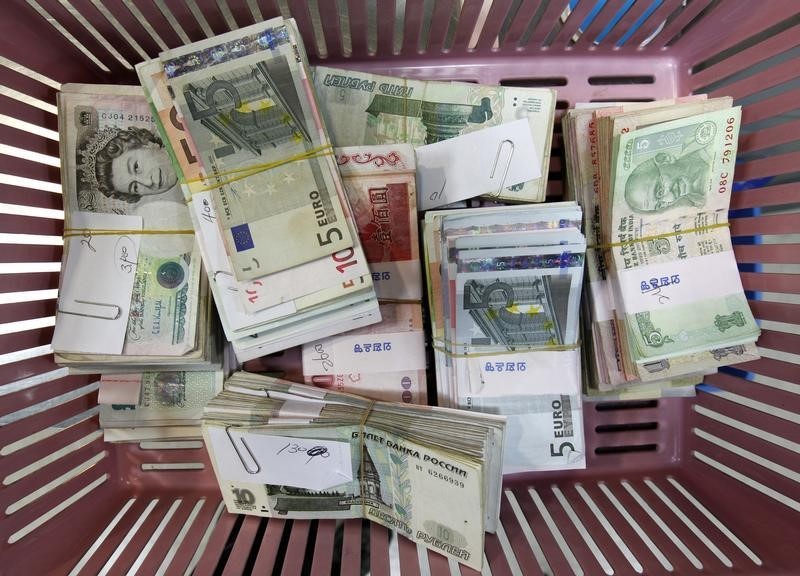* Gains in EU shares help to steady currency markets
* Euro pressed by falling inflation expectations
* Pound edges up after "Brexit" sell-off
* Dollar/yen up from Wednesday's trough (New throughout after start of European trade)
By Patrick Graham
LONDON, Feb 25 (Reuters) - Gains in European equities helped to steady currency markets on Thursday as sterling edged up from lows and the dollar trod water, with traders looking to Federal Reserve speakers later in the day for fresh direction on the U.S. rates outlook.
Dealers said there were signs of downward pressure building on the euro ahead of next month's European Central Bank meeting, at which ratesetters are widely expected to take more steps to ease monetary policy and bolster still very low euro zone inflation.
With doubts still growing over whether the Fed can raise rates in March, or indeed at all this year, the dollar was struggling to make headway at $1.1017 per euro, flat on the day. EUR=EBS
A 6 percent fall in Shanghai's stock market did not carry over into Europe, where shares rebounded in early trade, and also failed to extend a global sell-off that has driven cash into the traditional security of the yen JPY= and Swiss franc EURCHF= this month.
"We haven't seen contagion from the weakness in China and that is supporting risk sentiment. The yen has weakened since yesterday evening," said Thu Lan Nguyen, a strategist with Commerzbank (DE:CBKG) in Frankfurt.
"But I wouldn't sound the all-clear just yet. We see a persistent weakness in Chinese equity markets, and oil markets are still a risk."
Oil was down around 1 percent, but both Brent and U.S. crude were holding well above $30 a barrel and have looked somewhat steadier over the past week. O/R
Sterling licked its wounds near a seven-year low against the dollar after three tumultuous days since Prime Minister David Cameron called a referendum on Britain's EU membership for June 23.
The pound GBP=D4 was up 0.2 percent at $1.3953 and 78.95 pence per euro respectively. It is down more than 3 percent this week against the dollar, with a test of its 2009 low of $1.35 within sight.
"A slowdown in the pace of sterling's decline against the dollar doesn't yet signal a correction," Societe Generale (PA:SOGN) strategist Kit Juckes said, recommending the yen, the dollar and the Norwegian crown against the pound.
The euro has also been on the defensive against many other currencies this week, on fears a British EU exit could mean more uncertainty for Europe. But there was more attention on Thursday on a fall in inflation expectations, which bodes ill for the ECB's battle to refloat the economy.
The euro zone central bank's favoured measure of longer-term market inflation expectations fell to a record low below 1.4 percent on Thursday. EUIL5YF5Y=R It has fallen about 30 basis points since the start of the year due largely to lower oil prices.
People have started to price in the risk that the ECB will do more than previously assumed.
"Expectations have been quite low after the ECB disappointed in December," Nguyen said.
"But we can see that the euro zone still looks quite shaky and inflation expectations look low. That increases the chance that the ECB will do something more aggressive." (editing by John Stonestreet)
